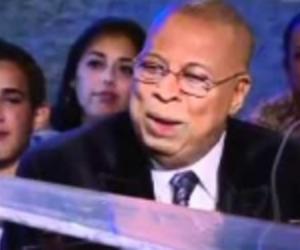Afro-Cuban jazz giant Valdés visits Three Stages
- Submitted by: lena campos
- Personalities
- 11 / 13 / 2012

The measure of extraordinary Cuban jazz pianist Chucho Valdés comes from the few lofty comparisons one can make about his work. McCoy Tyner, Oscar Peterson and Randy Weston are the outsized (physically and artistically) touchstones who can help define Valdés, which is not say he sounds like any of them. All greatest jazz artists, including Valdés, sound mostly like themselves, though echoes of the masters reverberate throughout their playing.
An acclaimed composer and arranger and a dynamic live performer, Valdés brings his new quintet, the Afro-Cuban Messengers, to Folsom's Three Stages on Tuesday evening.
It will a firsthand opportunity to see the pianist who combines the thunderous intensity of the young Tyner with the dizzying virtuosity of Peterson and Weston's profound understanding of cultural influences.
The biggest influence on Valdés likely remains his father, Bebo, himself a master pianist and former director of Havana's famous Tropicana nightclub.
Chucho (his given name is Jesús Dionisio) was born in 1941 in Quivicán, Cuba. As a child prodigy in a musically centered household (his mother gave piano and voice lessons), he was reportedly playing piano by ear at 3 years old. At 5, Valdés took piano and music theory lessons and soon was attending a music conservatory. Along with his formal training, the Spanish-speaking Valdés (who spoke to The Bee by phone through a translator from a raucous hotel room in Vancouver) said his father taught him popular music.
"My father taught me everything that has to do with Afro- Cuban rhythms," Valdés said.
"Rhythms from the Caribbean, rhythms from South America, and jazz, the African American music. He taught me the popular music of the Americans, the black Americans."
Rhythm has always been a major component of his smaller groups. Valdés has three percussionists in his current band – Yaroldy Abreu Robles on congas, Dreiser Durruty Bambole on batá drum and vocals and Rodney Barreto on drums – along with Gaston Joya on bass.
"We Cubans have rhythm in our blood," Valdés said. "That's the reason Cuba is one of the most-known countries for percussion, percussionists and the great variety of percussion instruments."
Valdés also cites the "African root" as a basis of his music.
"The Afro element is the folklore, that was brought to the island by the Africans. After they arrived in Cuba they had children and those children created something new. It was a mixture of the culture of the African descendents so there was a fusion of Afro and Cuban."
The Afro-Cuban influence on jazz has been deep and lasting since the late 1940s, when the legendary percussionist and singer Chano Pozo met and recorded with Dizzy Gillespie after being introduced by the Cuban trumpeter Mario Bauzá. Gillespie prominently credited Pozo for his own explorations into Afro-Cuban jazz, and in many ways the career of Chucho Valdés has been a natural continuation of this creative stream.
In 1973, Valdés founded Irakere, a groundbreaking group that fused classical elements of Afro- Cuban jazz with contemporary sounds, including funk and rock, through a dynamic horn- and percussion-driven ensemble. He since has worked in formats from solo piano to full orchestras.
The pianist's latest album, "Chucho's Steps," delves into the Afro-Cuban tradition while paying tribute to a broad history of jazz through its various references. Valdés pointed out that calling his band the Afro-Cuban Messengers was an obvious reference to the great drummer Art Blakey, who called his band the Jazz Messengers.
Similarly the title track, "Chucho's Steps," clearly refers to John Coltrane's seminal composition "Giant Steps." The album's first tune, "Zawinul's Mambo," deftly quotes several famous tunes from Weather Report co-founder Joe Zawinul, including "Boogie Woogie Waltz" and "Birdland."
"I was remembering one of the greatest keyboardists of contemporary jazz," Valdés said. "I was also a personal friend and admirer of Joe Zawinul."
The album includes a song recognizing his friendship with the Marsalis family, called "New Orleans."
"I first met Ellis (father of Wynton, Branford, et al.), who liked the sound of my band Irakere," Valdés said. "He had his sons listen to it because he wanted them to hear how a great band sounded with percussion and brass. I also later worked with Wynton and the Lincoln Center big band."
Valdés is now an international musical legend equally capable of quoting Ludwig van Beethoven, Cuban composer Ernesto Lecuona, Duke Ellington or Bud Powell, all of it filtered through the Afro- Cuban musical experience Valdés embodies.
Fuente: Sacbee.com
Comments